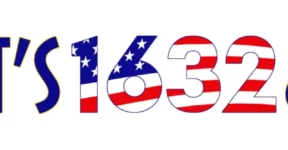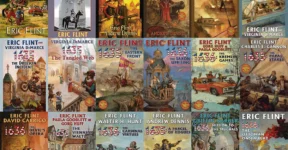1632, the first book in the Ring of Fire series, begins with an unlikely time travel incident in which the inhabitants of a small town of Grantville in West Virginia, and the entire town itself for that matter, get transported a few centuries back in time to 17th century Europe, more specifically in Thuringia of central Germany amid the Thirty Years’ War.

You might expect the people of Grantville to undergo some sort of dissonance, chaos, and disbelief immediately after realizing that they’re suddenly involved in one of the longest and most brutal wars in all of human history. But no, the Americans are quick to organize themselves and deal with the new realities with little of an internal conflict.
A lot of the complaints about the book are directed toward this specific issue. It’s said that Eric Flint, one of the principal authors of the series, must have a lot of faith in Americans. All the time travel paradoxes aside, readers want to see some kind of better realism in the story. Many people simply find it difficult to believe that Americans would behave in such a cooperative manner, considering their predicament. If the story happened in the real world, getting swiftly organized would be highly unlikely. How all citizens come together with no one asking questions about the time slip at all is unbelievable at best. Another critical argument is about the 17th century Europeans, who at times appear to adjust well (maybe too well) to the modern Americans.
It’s fiction alright, but the novel should at least make the story somewhat resemble reality. As the novel stands, the story leaves a lot of holes, and some readers just can’t get past the unexplained, leading to confusion and hard times understanding what’s going on. The premise is unique enough, but many find the execution lacking.
War does require some diplomacy. You can safely say that Grantville scores a major victory in the diplomacy front against itself. One counterargument often relies on the fact that the book was released over two decades ago, and a lot has changed in America over the years. It was written long before major historical events in the country, including the Great Recession and 9/11 attacks, meaning Americans weren’t so divided as they’re today.
But also consider the other alternative. A few thousand people in Grantville probably don’t agree on everything, but most of them have lived there throughout their lives. Although it’s not usually easy to get that many people organized in a short time, the impending challenges are just too great for them to remain selfish. Given the choice between being over-run by mercenaries who think of pillaging and raping as “normal” parts of their profession, working together to fight those enemies is only a logical decision. And the neighboring societies, who have been subjected to the same inhumane treatments by the mercenaries of war, will be glad to join the effort with the Americans. It shouldn’t take much of a persuasion to form a political alliance if the would-be allies feel threatened by the same enemy.
The whole camaraderie spirit probably doesn’t reflect today’s Americans. They might be easily divided or perhaps become each other’s adversaries when things are calm and relatively easy, but it also remains true Americans will stand united against a common external enemy. It’s this very part that mirrors the American way.
As the stories move forward with the later books, you’ll come across political intrigues played by many influential characters from the warring parties. Real life historical figures also come to the scene, such as Gustav Adolphus, Cardinal Richelieu, Oliver Cromwell, and many others. Some behave in non-historical ways, although their general outlook on the world remains intact, mostly.
Many of the books in the 1632 series revolve around dirty political plots against the Americans. Using one devious tactic or another, the political opponents engage in multiple attempts to match the American’s technological advantage. Political plays turn out to be major elements of the story; otherwise, the entire series would read almost completely like an adult power struggle fantasy. That said, there’s never a doubt that the modern West Virginians and their allies will come up victorious. Some say it’s a discussion of America’s modern version of imperialism, and the outcome is clear from the get-go.
We think Eric Flint simply wanted to showcase the striking difference between the socio-political situation during the Thirty Years’ War and modern America. He used the series, especially the main thread (which comprises seven books to tell the main plots) as a method to depict key features of egalitarianism and democracy that many people seem to take for granted. While he didn’t explicitly tell readers they needed to pay more attention to freedom of speech, equality before the law, the right to form/join union, etc., the story itself depicts how those elements could unfold in chaotic situations and make great contributions to defeat old world orders.
Are there any parallels between the Thirty Years’ War and present day conflicts? What were the most important political consequences of the war? We’d love to hear from you.
Other Things You Might Want to Know
How many casualties during the Thirty Years’ War?
Between 4,500,000 and 8,000,000 died during the war, including up to 6,500,000 civilian deaths.
What is egalitarianism?
It’s a socio-political doctrine that suggests equality for all. The school of thought is based on the idea that all humans have the same fundamental worth, and therefore every one of them must receive equal treatment under the law and is accorded equal rights.
What books (non-fiction) to read to learn more about the Thirty Years’ War?
- The Thirty Years’ War: Europe’s Tragedy by Peter H. Wilson (2011): the standard English textbook about the war
- The Thirty Years War edited by Geoffrey Parker (1997): a collection of essays with different perspectives
- The Thirty Years War: A Documentary History edited and translated by Tryntje Helfferich (2009): a collection of treaties, broadsheets, and interpretative essays
- The Thirty Years’ War and the Conflict for European Hegemony 1600-1660 by Sigfrid H. Steinberg (1966): old and outdated, not for new learners of the history of Europe
- The Thirty Years War: A Sourcebook edited and translated by Peter H. Wilson (2010): a collection of documents mostly from primary sources
- Experiencing the Thirty Years War: A Brief History with Documents edited by Hans Medick & Benjamin Marschke (2013): a collection of documents that focus on civilian perspectives of the war.
Check out other articles by month:







